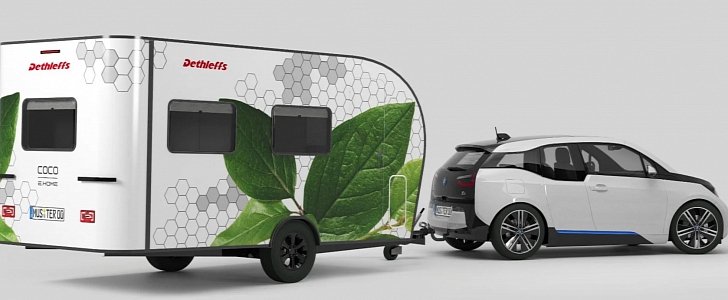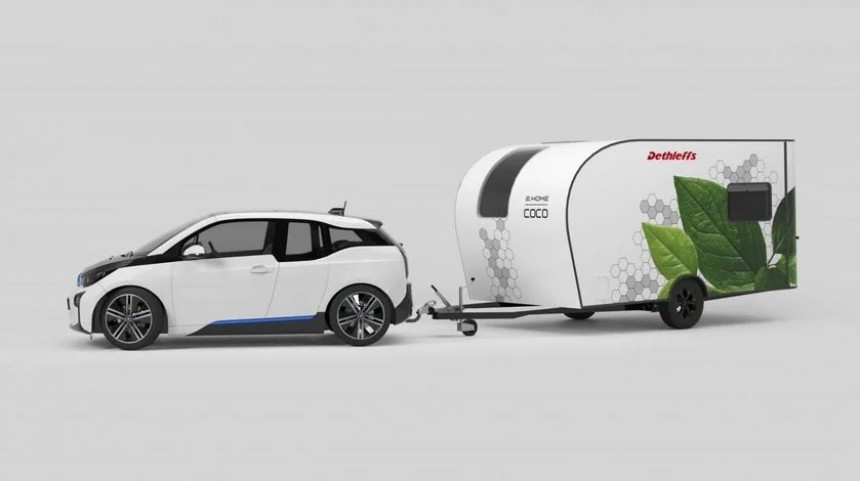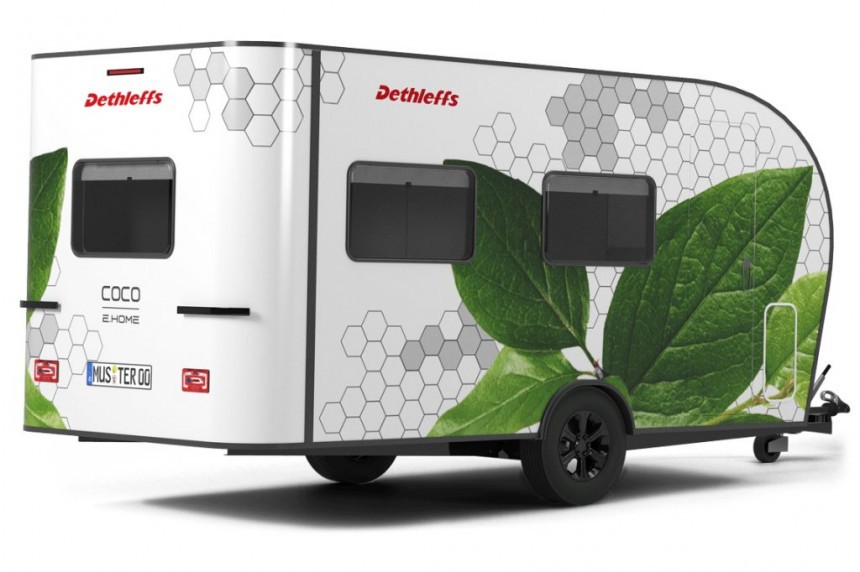Electric vehicles will soon become the norm and this entails, among other things, a major change in the caravaning industry. Enter the world’s first e-caravan, a little thing that is fully electric, and can tow and even park itself.
Unless we’re talking about the Tesla Model X, electric vehicles and towing don’t really go hand in hand. Germany-based caravan maker Dethleff has been paying attention to that and, back in 2017, came up with an idea that could potentially reinvent the concept of towing itself, if it proves functional: making the caravan or the trailer tow itself. Sort of.
The 2017 idea was followed by the debut of the concept of what the company called the world’s first e-caravan: the e.home Coco, which was presented at the 2018 edition of the Dusseldorf Caravan Salon, the biggest event of its kind in Europe.
One year later, toward the end of 2019, the e.home Coco was undergoing testing in view of going into production. The goal was to have it cross the Alps on a single charge, towed by an electric vehicle, sometime in 2020. As of the time of writing, it is uncertain if Dethleff was able to conclude the trial before the current health crisis broke.
Even if it wasn’t, the e.home Coco is still one of those projects you have to keep an eye out for, if only for the bold claims it makes. Because it’s fully electric itself, the caravan can actually tow itself, thus reducing the load on the vehicle towing it. If said vehicle is an EV, this means improving its actual range.
The e.home Coco is billed as the “solution for drivers of electric cars who do not want to give up a caravan” but, obviously, it can work just as well with a passenger vehicle with internal combustion. Dethleff says that, if the driver would usually tow about 2,000 pounds, the electric e.home Coco can reduce that tow weight to 220 pounds.
With a pair of electric motors in the wheel hubs, powered by an 80 kWh battery pack, the e.home Coco comes with torque vectoring. This translates into wheels that move on their own, propelling the caravan, and at different speeds depending on the terrain. Smart controlling through an app allows the driver to park the caravan without having to get inside the car to tow it – and Dethleff says accuracy would ensure safe parking even in the tightest spots.
The caravan is fitted with solar panels on the roof and has regenerative braking technology. These two work together to deliver enough juice to the battery to allow longer stretches off the grid. Everything inside, from cooktops to cooling and heating, would be electric.
When not in use, the caravan can be used as a back-up solution or mobile power storage for those looking to be less reliant on the public power grid. In other words, the e.home Coco would be an investment for use all around the year.
“e.home Coco invalidates the fundamental rules for caravans that have been in force for decades,” Dethleff says. "They are no longer just being towed behind a vehicle and are instead propelling themselves. This reduces the load of the towing vehicle, which also makes longer ranges practical when an electric car is used for towing.”
The real goal is, of course, to deliver a more sustainable variant of the traditional camper, especially in the context in which EVs are gaining popularity.
“After all, sustainability is all about preserving our natural world for future generations,” Dethleffs Managing Director Alexander Leopold says. “The e.home Coco demonstrates today that the caravan has an exciting future even in an era of electric cars.”
Even if the “crossing of the Alps on a single charge” challenge is a success, the e.home Coco still has many legal obstacles to overcome before it goes into production. All of them are tied directly to the innovations it’s supposed to turn into reality, like the fact that a category of self-propelled trailers does not exist, what category of driver’s license would be needed, and whether using a caravan as a mobile power storage solution would be legal.
The 2017 idea was followed by the debut of the concept of what the company called the world’s first e-caravan: the e.home Coco, which was presented at the 2018 edition of the Dusseldorf Caravan Salon, the biggest event of its kind in Europe.
One year later, toward the end of 2019, the e.home Coco was undergoing testing in view of going into production. The goal was to have it cross the Alps on a single charge, towed by an electric vehicle, sometime in 2020. As of the time of writing, it is uncertain if Dethleff was able to conclude the trial before the current health crisis broke.
Even if it wasn’t, the e.home Coco is still one of those projects you have to keep an eye out for, if only for the bold claims it makes. Because it’s fully electric itself, the caravan can actually tow itself, thus reducing the load on the vehicle towing it. If said vehicle is an EV, this means improving its actual range.
With a pair of electric motors in the wheel hubs, powered by an 80 kWh battery pack, the e.home Coco comes with torque vectoring. This translates into wheels that move on their own, propelling the caravan, and at different speeds depending on the terrain. Smart controlling through an app allows the driver to park the caravan without having to get inside the car to tow it – and Dethleff says accuracy would ensure safe parking even in the tightest spots.
The caravan is fitted with solar panels on the roof and has regenerative braking technology. These two work together to deliver enough juice to the battery to allow longer stretches off the grid. Everything inside, from cooktops to cooling and heating, would be electric.
When not in use, the caravan can be used as a back-up solution or mobile power storage for those looking to be less reliant on the public power grid. In other words, the e.home Coco would be an investment for use all around the year.
The real goal is, of course, to deliver a more sustainable variant of the traditional camper, especially in the context in which EVs are gaining popularity.
“After all, sustainability is all about preserving our natural world for future generations,” Dethleffs Managing Director Alexander Leopold says. “The e.home Coco demonstrates today that the caravan has an exciting future even in an era of electric cars.”
Even if the “crossing of the Alps on a single charge” challenge is a success, the e.home Coco still has many legal obstacles to overcome before it goes into production. All of them are tied directly to the innovations it’s supposed to turn into reality, like the fact that a category of self-propelled trailers does not exist, what category of driver’s license would be needed, and whether using a caravan as a mobile power storage solution would be legal.








